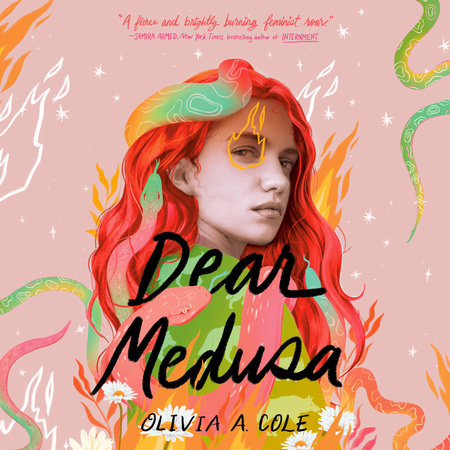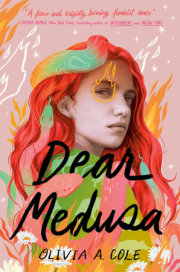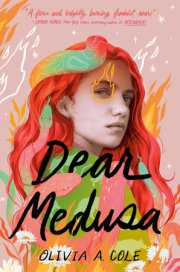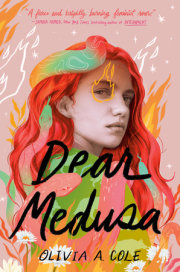Friday, August 31
The worst part of working fast food is the name tag
because there’s always somebody’s mom with coupons
who thinks they are somehow being cheated by the teenager
at the register, and their eyes always dart down
to your chest to look for a way to be in charge.
“Listen,” she says, and I see her eyes laser in,
search out my name.
“Alicia. You overcharged me for my mozzarella sticks. Now,
do I need to ask for the manager or are you going to make it right?”
Make it right. Ever since last year, everything
sounds like justice or
its burning absence.
She thinks she’s been done grievous wrong
by the two dollars extra on her waxy receipt
and my mouth is supposed to be apologizing
but my mind is on everything else:
• the whole school/world calling me a whore
• Sarah cutting me out of her life like a tumor
• my parents, the wood chipper of their life between them
In the end I just say, “Ma’am, I’ll do my best.
I’ll do my very best.”
We both know
she’ll still call the manager over,
will still make the world a witness
to all the things she thinks she deserves
even with my smile so bright
it shatters.
It’s my last weekday shift before school
and it’s just girls on the clock, no creepy manager,
no too-old guys pretending they’re still in high school
and eyeing you over curly fries.
Slow day. No construction workers,
no cops expecting free food,
no guys in suits who refuse coupons
because they want you to know
they’re rich:
just teenage girls who don’t go
to the same school,
carrying different gossip
not about each other
and thus unimportant.
Stephanie is the shift manager
and she’s only twenty-one so
when there’s no customers
she lets us turn up the lobby music
and all of us sing along.
The final day of August is like a guillotine
separating September from the rest of the summer
in one clean slice, the red sun bleeding out
over my feet as I circle the school
in my Meat Palace uniform
one more time before I start junior year.
It’s empty. No one but me
would ever come to school while the freedom
summer drops like gold confetti
still sparkles on our shoulders.
But I like it like this, the quiet, the way
the beige bricks drink up the sunset,
taking on a color that reminds me
of a desert. Dry, baked,
vicious.
I’ve never been anywhere but here.
My feet take me to the track, like they miss it.
Maybe they do. Maybe they remember
how it felt to transform
from girl to mustang
with grateful lungs heaving.
Freshman year
I could fly.
Then sophomore year happened.
I look back at the pink bricks,
settling into a deeper shade
now that the sun is sinking.
I’m sinking too, down onto the bleachers,
the metal warm against my thighs.
This school is empty of people
and full of memories
and I don’t want
any of them.
My mother offers to iron my school uniform and even though I want her to, I say no,
because sometimes
in this place
where I am
it feels good to refuse
help, because saying yes
to even something like an iron
feels like saying yes
to everything else
when my whole life
has become a pipe bomb
full of pieces
that explode in a furious
no.
Tuesday, September 4
The school bus stops on my block but I don’t get on.
I’ve been taking the city bus all summer
and I like the way it makes me feel
like I’m living in a different world
than the people who are supposed to be
my peers. What’s the difference?
At least on the city bus
I can pull the string,
and it makes me feel
like I’m in control.
I can get off whenever I want
wherever I want
even if my destination
is predetermined.
On the city bus I can still wonder
what the people there think about me,
whereas at school
once I walk through the door
I already know what they’re all thinking,
what they’re all going
to say
about all the versions of me they think they know,
laid alongside
all the girls I was before
in stark contrast.
Flashbacks
They are like ripples on a pond and they begin
in my earliest memories of myself:
Playing in the fountains at Elwain Park
with no shirt on, five-year-old bird
chest
Eight and pointing at bras in Target, my brother
wearing them like hats while my mother
shopped and I laughed
Sarah getting her first bikini, me ten
and silent and feeling a brand-new envy
grow in like ivy
Me eleven
Me twelve
Me thirteen
Me fourteen
Curious and curious
Me warming up
Me sneaking to buy my first thong
Me excited for someone
anyone
to notice
Me kissing Michael Strong
the day I got my braces off
just to feel what someone’s tongue felt like
sliding across new teeth
Me hearing about what good girls
do and think and say
and always feeling like a neon opposite
even if only in shadow.
Me thinking I had secrets until last year
when I learned what it meant--
what it really meant--
to hide.
There’s always a white kid who says “Why do the Black kids sit together in the cafeteria? They segregate themselves.”
And I’m a white girl too so what do I know
but I think the answer is so obvious in a school as white
as this one
where Halloween parties still feature blackface and redface
where the student council only barely voted
(5–6)
to maintain a special events calendar for Black History Month
and the cheerleading squad is all white but shouts yas queen, werk! between routines.
Dawn of Day 1
and we’re all in the cafeteria waiting to be dismissed,
the swell of the student body heaving as if on a ship at rough sea,
all of us deciding where we fit, where to squeeze in, if anyone we hate or love
has rendered certain sections unsittable.
The girl who says it this year is skinny and blond,
a sophomore, and her whole table murmurs and laughs,
casts glances at the three tables where the couple dozen Black students,
the half-dozen kids from Mexico and El Salvador,
all take refuge in each other’s presence.
Why wouldn’t they
when to sit anywhere else in this sea of narrowed eyes and fake laughs
would be like throwing yourself overboard?
I’d never say that I consider my pain equal
but I can say I know
how it feels to step onto a ship
and be confident that everyone on board
is watching you, thinking that you’re not a sailor
but a creature from the deep.
The only text messages I get are from coworkers.
Mariah: can you take my shift tomorrow
Alicia: what time
Mariah: 3:30
Mariah: . . . ?
Alicia: I’m in school, sorry. Yes I’ll take it.
Mariah: I thought you were dropping out
Alicia: I wish
And from random dudes.
Him: Thinking about you
Alicia: I know what that means
Him: yeah;)
Him: free tonight?
Alicia: tomorrow
Day 1 was a success
in the way that surviving a haunted house
is a success:
I walked through the halls and saw
lots of ghosts
but never
the Devil
himself.
The garage is full of smoke
and someone who doesn’t live in this gray
house might think something is on fire.
If they looked closer they would know nothing
is, the smoke they see only the last remains
of what has finally ceased to burn. What’s left
of my family is a cold smolder. Divorce
is only white-hot for so long. If you’ve ever watched a fire
you know it eventually gives way to a gray zero,
smoke coming from nothing, piles of ash.
The smoke is my mother sitting in a lawn chair
cigarette in hand, coffee can next to her for the ashes.
She talks to her mother
or her sister
sometimes a friend from college
and from where I stand in the kitchen
I can hear the low blur of her voice,
the clink of the can when she taps,
the slide of a beer across the concrete.
It’s only the two of us.
My brother and my father have become
heavy apparitions. They exist but on a different
plane. My mother is here with me but she’s
also somewhere else--on nights like tonight
the garage is a distant universe
I would need time travel to cross.
Sometimes I stand at the door and try to listen
while my leftovers spin in the microwave.
Occasionally she laughs,
but mostly she cries.
My parents met when my father was still mid-divorce
with his first wife, one child already somewhere
in Montana.
He was 31 and my mother 20
and she was dancing at a college party
when he saw her,
her hair the same black as fresh asphalt
but softer, and swinging,
and he never danced
but that night he danced for her
the way birds in the wild
spread feathers and perform.
But like geese
and not doves,
my father takes many mates
and even when my mother still waxes
romantic about love at first sight
(even now)
and the way the music slowed
when their eyes met,
sometimes I wonder
(since the divorce)
what he was doing at that party
in the first place.
Portrait of a day
Dawn and toast.
Bus and its flickering yellow light.
School and its silent rivers of judgment.
Boys and their fingers in my belt loops
even when we don’t know each other.
No Sarah. No nobody except
a girl in physics who talks to me,
but she talks to everybody.
Weeks 1 and 2 down and I skipped art
both weeks to avoid the hallway
where “it” happened.
Lots of ghosts, but no Devil.
Bus. Meat Palace.
Repeat.
Thursday, September 13
Sometimes people put notes in my locker’s grille
Sometimes one word, sometimes several,
never more than a sentence.
One at the end of last year said
sex isn’t a hobby and I had so many questions, the first
of which was
is putting weird notes in people’s locker a hobby? But that’s the voice in my head
that says I’m too mature
to let these things bother me.
That voice is a little
overconfident.
Still, I had to laugh
when I looked up
hobby in the dictionary app
on my phone:
hobby: (n) an activity done regularly in one’s leisure time for pleasure.
The note-leavers didn’t waste any time this school year
so when I see the paper poking out from down
the hall, my stomach sinks, even as the mature
voice in my head says something tough
like
let’s see if their handwriting has improved. It has.
Neat blue pen.
Circles dot i’s.
But this one doesn’t feel
like the others.
It says:
WHAT’S DONE IN THE DARK
WILL BE REVEALED IN THE LIGHT
and if I didn’t know Sarah
was twelve miles away at her new
school, I’d think it was her
issuing one last barb--it sounds
just Bible-thumpy enough.
There are more words on the back
but I don’t read them.
I may be a lot of things
but a masochist
isn’t one of them.
Friday, September 14
I have two shirts for work and only ever wear one.
Terry is the new manager of the restaurant--transferred in when Joey got caught
setting up a fake robbery, emptying
the safe into the backseat of his car.
No bag or anything. Shit for brains.
But I would rather have Joey than Terry, who is older and goes to church and wears a tie
every day like he doesn’t know this is a Meat Palace
in a nondescript part of town.
He lurks in drive-thru while I’m working, tells me to take my nose ring out.
He pretends he has to stand very close to me to see if I’m wearing it or not.
He thinks because I am sixteen that I don’t know every trick in the book.
Maybe I don’t. But I do know
there is a book
and that Terry pulls pages from it when he
leans close to see my nose ring
slips close behind me when he’s restocking napkins
stands close when the cashier steps out to take her break
Close close close
Never quite touching.
I know it will come--it always does
when men like Terry take your silence
for consent
or better yet
total
ignorance.
They know if you can claim not to know
that they can too,
like a hand down a teenager’s bra
is just a mistake
a slip in a puddle
an agree to disagree.
I can hear my (ex) best friend’s voice now, Sarah:
“If you hate it so much then quit.”
“If it really bothers you then why haven’t you said anything”
At the time (before she cut me off)
I didn’t have the words that I have now.
I didn’t know how to say
“This world is full of wolves. I’ve already
met worse wolves than Terry.
Terry is just a dog. Running from a dog
At this point,
at this juncture
in my career with wolves,
feels like admitting I’m a rabbit
when every day I feel more like a bull.
Sometimes wolves hunt bulls
and they win. But sometimes
they get the horns.”
The first wolf I remember was bagging my mother’s groceries.
I was fourteen and we’d just come from the pool.
(That doesn’t mean I was wearing a bathing suit.
That doesn’t mean I was wearing shorts.
People always wonder what I was wearing.
Why
when it comes to girls and wolves
do we let our brains look for reasons
why she deserved to be prey
before we notice his fangs?)
His name was Adam. He was twenty-one--
I learned this later.
At the time he was scanning my mother’s
broccoli and bread
and when her eyes lowered to her purse
his rose to me.
Sometimes I remember the way the blush
felt crossing my cheeks and wonder
if I was to blame after all. After all
I was pleased to be noticed.
An older boy,
a man,
someone with perspective.
Not many people really noticed me at school
(before “it”).
But Adam did.
I thought he saw something my peers
didn’t see. I thought maybe in that moment
under the fluorescent lights
I had transformed into something worthy.
My father came back then from buying
a lottery ticket and if he saw Adam’s eyes
he pretended not to.
My father never liked conflict.
He avoided it like chewed gum
on the sidewalk.
Maybe if he were different
everything else would be too.
You are the ghost in the ghost town when people pretend you are dead.
When I started sleeping with guys, my friendship with Sarah became an hourglass.
Copyright © 2023 by Olivia A. Cole. All rights reserved. No part of this excerpt may be reproduced or reprinted without permission in writing from the publisher.










